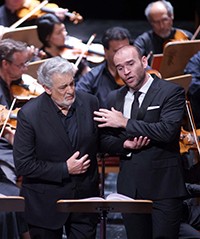
I due Foscari es una de las obras compuestas por Verdi en los llamados “años de galera”. Así se refería el propio compositor a los siete años en los que compuso nada menos que once óperas. No se trata, ni mucho menos, de una de sus mejores obras. Ni siquiera de las más conocidas. Pero hay algo en I due Foscari para que sea representada más veces de lo que su calidad y posición en el repertorio le otorgan.
Tal vez gracias al tiempo y la perspectiva, teniendo en cuanta los trabajos posteriores del maestro italiano, se esté posicionando mejor.
Los personajes de este drama “familiar» romántico (padre, hijo y nuera) poseen una marcada personalidad. Alguna de ellas, concretamente la de Jacopo Foscari, provocaron discrepancias entre Verdi y su libretista Francesco María Piave. La pusilanimidad del personaje, unido a su escasa presencia durante toda la obra, llevaron a Verdi a solicitar de Piave algunos cambios importantes. El resultado final fue un mayor peso de este personaje desde el inicio de la obra y su protagonismo en algunas de las páginas vocales más bellas.
La representaciones que estos días se pueden ver en el Teatro Real son en versión concierto. O, más concretamente, semiescenificada. Dada la capacidad de dramatización de un potentísimo cuadro de cantantes que demuestran que la ausencia de escenografía, no impide una magnífica representación operística.
La dirección musical de Pablo Heras-Casado tiene un efecto energético sobre la orquesta, los cantantes y la propia obra. Ya desde la obertura se evidencia el vigor con el que Heras-Casado interpreta la partitura. Con esta misma fuerza dirige a unos cantantes que llenan su interpretación de nervio y tensión. Existen momentos de peculiar belleza en los duetos y cuartetos de violín y violonchelos interpretados por los solistas.
Lucrecia Contarini, esposa de Jacopo Foscari, está interpretada por Angela Meade. Esta norteamericana de Washington se desenvuelve vocal y dramáticamente bajo los más estrictos cánones de la ópera tradicional aunque adolece de cierto automatismo. Pero lo realmente impresionante es el volumen estratosférico de su voz. Característica que no le impidió ofrecer unos filatos de muy buena factura. Las vibraciones que emite, al menos al escucharla desde la tercera fila, impresionan. Como demostró ya desde el arranque con Tu al cui sguardo onnipossente…
Michael Fabiano
Volvía al Teatro Real el tenor norteamericano Michael Fabiano, como Jacopo Foscari. Mucho ha evolucionado su voz desde aquel Cyrano de Bergerac de 2012.
Con un notable volumen de voz y una tesitura más de spinto que de tenor dramático, Fabiano ha construido un Jacopo Foscari dramático y desesperado. Fantástico en sus romanzas, sobre todo en la segunda, Notte, perpetua notte!. Muy exigente por tesitura y dramatismo y que Fabiano resuelve con gusto y elocuencia.
Antes de su intervención, tuvo la gentileza de contestar algunas preguntas para Brío Clásica.
No fue hasta que llegó a la universidad e inició sus estudios, cuando se dió cuenta del enorme potencial que tenía su voz. Fue en ese momento cuando inició su carrera.
Brío Clásica.: En su misma tesitura, ¿quiénes son los cantantes en los que se fija?
Michael Fabiano.: Aureliano Pertile, por la magnitud infranqueable de su técnica. Mario del Monaco, por su compromiso en la interpretación. Franco Corelli, por su heroísmo y Plácido Domingo, por su profunda pasión y maestría.
B. C.: ¿Cómo se siente cuando se le compara con un joven Pavarotti?
M.F.: Siento una profunda humildad.
B. C.: No es la primera vez que canta junto a Plácido Domingo, ¿cómo es esta experiencia?
M. F.: Es un honor para mi, teniendo en cuenta su enorme trayectoria y su inmenso legado.
B.C.: Sus roles como Rodolfo en La Bohéme y en Luisa Miller han tenido una gran aceptación por parte del público. ¿Qué otros papeles se ve interpretando en el futuro?
M. F.: Me veo en óperas como Un Ballo in Maschera, Simon Boccanegra , Attila, Ernani, La Battaglia di Legnano, Mefistofele , Manon, Werther, Romeo et Juliette o Carmen.
Pronto volveremos a disfrutar de él en España.
El baritenor, como él mismo se denomina, Placido Domingo, era uno de los mayores atractivos de la noche, interpretando a Francesco Foscari. La discusión sobre la tesitura de Plácido Domingo debe dejar de existir. Es un artista. Un artista grandioso, capaz de inventar una tesitura acorde con la evolución de sus características vocales y utilizarla, junto a sus habilidades sobre el escenario, con una finalidad única, el éxito en la interpretación. Cada una de sus intervenciones fue aplaudida hasta llegar a la ovación final. Increíble mérito tiene además el hecho de no dejarse tapar por la cascada de voz de Meade.
Otro que no anda escaso de volumen vocal es el bajo italiano Roberto Tagliavini en su papel del malvado Jacopo Lorendano. A la altura del reparto principal estuvieron la soprano Susana Cordón, como Pisana y el tenor Mikeldi Atxalandabaso, como Barbarigo.
Una fantástica noche de ópera, en la que el público disfrutó y lo demostró aplaudiendo en pie durante varios minutos. Un final de temporada que deja un excelente sabor de boca y la mejor tarjeta de presentación para la próxima.
Texto: Paloma Sanz
Imágenes: Javier del Real
Vídeos: Teatro Real
